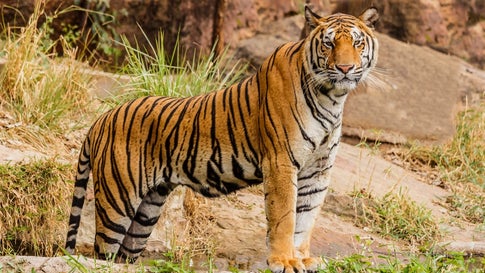With as few as 3890 tigers left in the wild, the thrill of spotting one of these rare and elusive predators in their natural habitat is simply unmatched. It’s also a much more sustainable alternative to visiting a captive tiger attraction, many of which have come under fire for animal mistreatment.
The modern world hasn’t been kind to tigers. Three of the nine tiger subspecies became extinct within the last century, and the remaining six are endangered, some critically, with ongoing threats to survival ranging from habitat loss to illegal poaching. But there is some good news, with wild Bengal and Siberian tiger numbers both increasing in recent years, and continually improving tourism infrastructure in key tiger habitats offering visitors a good shot at spotting one with minimal impact on the animals. To mark International Tiger Day (29 July), here’s a guide to the places where you might be lucky enough to see tigers in the wild.
 A Bengal tiger on the prowl in India
A Bengal tiger on the prowl in India
Madhya Pradesh, India
Home to 70 per cent of the world’s wild tigers (with its population of Bengal tigers numbering 2226 during the last census in 2014), India offers the world’s best tiger-spotting opportunities. Of its 50 tiger reserves, Madhya Pradesh – known as India’s ‘Tiger State’ – is home to some of the country’s most accessible and best-managed reserves including Kanha, which is widely thought to be the setting of Rudyard Kipling’s classic The Jungle Book. Ranthambhore National Park in Rajasthan and Corbett Tiger Reserve in Uttarakhand also offer particularly good chances of sightings.
- How safaris work: With the exception of Satpura in Madhya Pradesh, which is the only reserve offering walking safaris, safaris are conducted in Maruti Suzuki Gypsies which can be booked for morning, afternoon, and sometimes night drives with a local guide. Aim for at least four drives for the best chance of spotting a tiger.
- What else is there to see: Other wildlife you’re most likely to spot include deer – particularly sambar, spotted and swamp deer – raptors (owls and eagles), gaur, langurs, macaques, and if you’re lucky, maybe even a sloth bear or a jungle cat.
- When to go: Most tiger reserves close during the July–September monsoon season. While tigers can be spotted year-round, the hot, pre-monsoon months of April and May tend to offer the best sightings (typically at waterholes).
- Make it happen: The remoteness of reserves makes organised tours an attractive option. PureQuest Adventures offers a 13-day ‘Jungle Book Adventure’ taking in Satpura, Pench and Kanha Tiger Reserves. If you’d prefer to stay in one spot, visit Forsyth Lodge in Satpura, which works with the local community to provide transfers to Bhopal’s airport, a four-hour drive away.
 Nepal’s tiger numbers are on the up – and Bardia is one of the best places to see one
Nepal’s tiger numbers are on the up – and Bardia is one of the best places to see one
Bardia National Park, Nepal
Thanks to concerted conservation efforts during the last decade, Nepal’s Bengal tiger numbers have almost doubled during that time frame, with more than 235 individuals roaming across five national parks. Chitwan might be the best known, but in the nation’s remote northwest, Bardia National Park is considered the best place to spot one of the 80-odd tigers that call it home.
- How safaris work: All Bardia safari lodges offer walking and 4WD safaris. While you can cover more ground in a half-day driving safari, full-day walking safaris lend to more intimate wildlife viewings. With guides carrying only a bamboo pole for protection (tiger attacks are rare, but not unheard of) it’s a bigger thrill, too.
- What else is there to see: Look out for Bardia’s 30-odd greater one-horned rhino, as well as otter, crocodiles, wild elephants, five species of deer, and more. At the very least you’ll meet Vikram the rhino, a victim of human-wildlife conflict living out his days in an enclosure near the park entrance.
- When to go: Bardia is open year-round, but as with India, it’s generally easiest to spot tigers in the hot season when tigers (and rhino) can often be seen cooling off in the Girwa River.
- Make it happen: Of the several dozen safari lodges in or near the village of Thakurdwara, near the park entrance, Bardia Ecolodge is a standout for its superb meals and fantastic local guide. For more comfort, consider the luxurious Karnali Lodge run by responsible tourism pioneer TigerTops. All good lodges can arrange transport from the local bus stop, or from Nepalganj, the closest airport.
 A Bengal tiger drinks from a waterhole at Sundarban National Park
A Bengal tiger drinks from a waterhole at Sundarban National Park
The Sundarbans, Bangladesh
Straddling India and Bangladesh, the Sundarbans is the world’s largest mangrove forest. Thought to be home to more than 110 Bengal tigers, the misty maze of tidal waterways and small islands is best visited from the Bangladeshi side, which offers deeper access, maximising your chances of spotting a tiger. Sightings, however, are rare.
- How safaris work: Safaris consist of a multi-day boat tour from the southwestern city of Khulna, or nearby. You’ll eat and sleep onboard your main tour boat, but during the day you’ll break into smaller groups and track tigers, either on foot (accompanied by armed forest guards) or on smaller boats (along narrower river channels).
- What else is there to see: The Sundarbans is home to a wealth of wildlife – you can expect to spot saltwater crocodiles, wild boar, langurs and many of the region’s 260 bird species.
- When to go: The cooler season from October to March – when you may spot tigers sunning themselves on river banks – is the most comfortable time to visit, but you’re more likely to see them in the water during the hotter months of April and May.
- Make it happen: UK-based Responsible Travel offers an eight-day tiger safari in the Sundarbans with a zoologist guide. Reputable Khulna-based operators include Bengal Tours and Guide Tours, both of which offer three-day tours.
 Track pug marks in the snow in Russia for a chance of seeing a Siberian tiger
Track pug marks in the snow in Russia for a chance of seeing a Siberian tiger
Durminskoye Reserve, Russia
Primarily found in eastern Russia and northern China, the Siberian or Amur tiger is the largest tiger species, and among the most endangered. Hunted to the brink of extinction by the 1940s, the subspecies was saved when Russia became the first country to grant full protection of tigers in 1965. With the current tiger population estimated to number around 540 individuals, however, the chance of spotting one is slim.
- How safaris work: Most tours are based in Durminskoye Reserve, a 50,000-acre wildlife sanctuary three hours from Khabarovsk in southeastern Russia and the prime habitat for the last remaining Siberian tigers. Most tours run like citizen scientist projects, with guests spending their days tracking pug marks on snowmobiles and on foot, setting camera traps and reviewing the footage, making a valuable contribution to the protection of the species.
- What else is there to see: Keep your eyes peeled for wolves, lynx, badgers, foxes and raptors. In the summer months, Asian black bears sometimes make an appearance.
- When to go: The winter months (particularly between November and February) provide the best conditions for tracking tigers.
- Make it happen: Natural World Safaris runs a seven-day tour in Durminskoye Reserve hosted by frontline Russian conservationist Alexander Batalov. Batalov runs Russia Tiger Tracking, Russia’s first ecolodge dedicated to tiger tracking, which also accepts independent bookings.




